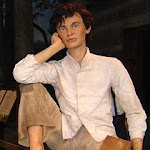
Sometime in the not so distant past – in boomer time, where distant becomes more abstract as time goes on – a woman starving for intellectual growth and yearning to complete her college degree stepped into a classroom on Arsenal Island in Rock Island, Ill. The course, offered through Western Illinois University, was Literature of Illinois. The instructor was John E. Hallwas. That class started a fire of passion for the history and literature of Illinois in the boomer which can’t be extinguished. Bet you can’t guess who that student was – this blogger, perhaps? Right.
Although Hallwas isn’t among the Lincoln scholars you often hear mentioned in the popular press, his name and work is well known in west central Illinois. He’s without a doubt the quintessential scholar of the literature of Illinois and of the forces which mold its communities and help them live on in memory. Lincoln, of course, is one of those forces. And, yes, Hallwas has written of him.
I’d like to step away from Lincoln for a few minutes to tell you about Hallwas’ latest book. It may not seem like it at first, but there is a Lincoln connection here.
Dime Novel Desperadoes
Dime Novel Desperadoes: The Notorious Maxwell Brothers, the latest Hallwas book, published by the University of Illinois Press, is significant to the study of Lincoln because it explores and exposes many of the socioeconomic elements at play in nineteenth century Illinois.
The book is the true tale of Ed and Lon Maxwell, sons of often-relocating, struggling tenant farmers. The Maxwell boys’ paths went astray and lives went awry, due to a number of circumstances on their life’s journey, one of which most certainly was the hardship on their family when their father left them to serve in the Civil War and returned home in more fragile health than when he left.
Lincoln buffs among us will find interest in the coverage Hallwas gives to the differences which divided the people of Central Illinois over the Civil War, often leading to unrest and acts of violence. “Some viewed Lincoln – who had visited Macomb twice in 1858 – as a destroyer of the Union and a threat to constitutionally guaranteed rights, while others viewed him as the preserver of the Union and champion of freedom.”
Hallwas also wrote of a number of Illinois murder trials where the murderer was let off because of the perception the victim “had it coming” – reminiscent, I find, of when Lincoln defended Peachy Quinn Harrison for the murder of Greek Crafton. Harrison got off because Lincoln called the suspect’s grandfather, Methodist circuit rider Peter Cartwright, to testify. Cartwright’s testimony about Crafton’s words from the deathbed played on the sympathy of the jury. In essence, the victim said he’d brought it upon himself. Hallwas writes about how this same frontier justice comes into play in older brother Ed Maxwell’s life, when he receives harsher punishment for stealing a horse than many do for murder.
"Horse thieves aroused the ire of residents in Illinois and other western states like no other robbers, simply because people were so dependent on horses for work, travel, and emergency situations. And like America’s soon-to-be-mythic cowboys, many homesteaders deeply prized their horses. So, prosecution for assault of some kind, and even murder, often resulted in acquittal or a light sentence, especially in turbulent Fulton County, but horse theft was more dependably and severely punished."
It was this inequitable treatment of lawbreakers which was to land Ed inside the limestone walls of the penitentiary at Joliet and set in stone his identity as a criminal. From here, the Maxwell brothers continue on a downward spiral which ends…
No, I won’t tell you how. You need to read the book yourself to see how two farm boys from Illinois get so far off the path that they end up being memorialized as the desperado Williams brothers in dime novels.
In this, as in all his books, Hallwas uses a creative voice which is second only to that which he uses in his lectures. In his writer’s workshops, Hallwas always teaches his students to read their work out loud. It’s obvious he practices what he preaches, as the color and rhythm in his well-written words will captivate you and keep you coming back for more.
Other Hallwas books
So, for more, check out any of the 20-some other books Hallwas has written or edited, including
- Vision of This Land: Studies of Vachel Lindsay, Edgar Lee Masters, & Carl Sandburg
- The Poems of H: Lost Poet of Lincoln's Illinois
- Illinois Literature: The Nineteenth Century (a wonderfully done compilation of Illinois works which define Illinois during Lincoln’s time)
- Spoon River Anthology: An Annotated Edition
- The Bootlegger: A Story of Small-Town America
- Studies in Illinois Poetry
- Western Illinois Heritage
- McDonough County Heritage
- Selected Writings of Robert G. Ingersoll
- Macomb: A Pictorial History
- Kingdom on the Mississippi Revisited: Nauvoo in Mormon History
- Cultures in Conflict: A Documentary History of the Mormon War in Illinois
- First Century: A Pictoral History of Western Illinois University
- Keokuk And The Great Dam
- McDonough County Historic Sites
- The YMCA of McDonough County: A centennial history
- Thomas Gregg: Early Illinois journalist and author
- Essays in Literature
- Tales From Two Rivers I
- Tales From Two Rivers II
- Tales From Two Rivers III
- Tales From Two Rivers IV
- Tales From Two Rivers V
Hallwas to speak in Bloomington
For those of you who live in Central Illinois, you’ll have a chance to hear Hallwas this coming Thursday, Nov. 20. He’ll be at the Bloomington Public Library for a book signing, slide show and lecture about the Maxwells and other Illinois outlaws, sponsored by the Illinois Humanities Council.
© Copyright 2008 Ann Tracy Mueller. All rights reserved.
